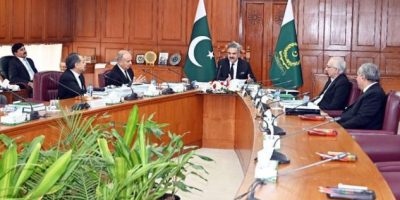Roundtable on “Violations of Rights of Religious Minorities –Muslims & Sikhs – in India

Use of force and violation of the rights of religious minorities at the hands of Hindu extremists backed by the Indian Government has become a common occurrence. In such a hostile environment of coercion, denial of equal rights and discrimination, space for India’s religious minorities is fast shrinking, laying bare the falsehood of the Indian Constitution and its claims of being a secular state. These were some of the views shared by speakers and participants of the roundtable on “Violations of Religious Minorities –Muslims & Sikhs – in India” organized by the Islamabad Policy Research Institute here in Islamabad today. Welcoming the speakers, Acting President of the Institute Brig (R) SohailTirmizi, SI(M) outlined the importance of the roundtable in order to awaken the world conscience against the brutalitieson Indian Muslims and Sikhs primarily, but also against innocent unarmed Kashmiris, Christians and Harijans by India.
In the session chaired by Dr. ZafarIqbalCheema,President & Executive Director, Strategic Vision Institute (SVI), Islamabad,Mr. Khalid Rahman, Director General, Institute of Policy Studies (IPS), Islamabad spoke onIndian Secularism and Policy towards Religious Minorities: Myth and Reality (Case of Muslims).‘The reason India chose Seclurism over Hinduism—constitutionally—is not by choice, it is rather because of inescapable political needs of the country,’ said DG IPS. According to him, the reason why incidents of abuse and mistreatment have been and are taking place against religious minorities in India is because secularism in the country is merely an arrangement for political gains, without any commitment to its core values. He pointed out that since Modi’s BJP government came into power, Muslims have been targeted under varioushate campaigns such as GharWapsi, Love Jehad, and most recently in the name of cow vigilantes and ban on beef slaughtering.Quoting a 2017 report by India Spend, he informed that in the 63heinous hate incidents during 2010–2017, 86% of the victims were Muslims and 98% of these incidents occurred after NarendraModi assumed power. He recommended that to gain representation in political and administrative avenues,Indian Muslims need to devise innovative and comprehensive socio-academic strategies with which they can empower themselves and protect their rights. Networking and alliances with the ‘saner’ elements in Indian society should also be an essential part of their strategy. While in the international arena, there have been voices raised at the United Nations, as well as reports by rights’ organizations, the need is to make these voices strong enough to put real pressure on India to be fair to its minorities, he stressed.
Dr. Muhammad MujeebAfzal, Assistant Professor, School of Politics and International Relations, Islamabad discussed thePlight of Muslim Community and Indian Atrocities on the Kashmiris. He outlined that Indian Muslims are victims of the ‘Indian Myth’of nationhood and socio-cultural integration of Hindu majority which is deeply entrenched in their discriminatory caste/class system.He added that in India, no recognition has ever been given to religious minorities constitutionally. However, during the entire process, the important issue for Muslims was how to protect themselves and their values in order to emerge as a community with their own political identity.DrMujeeb pointed out that politically India’s reliance on aggression against minorities ensures a large vote bank since the presence of religious minorities is perceived to be a hurdle in the process of national integration. In the process of cultural transformation, religious minorities especially Muslims have been a victim of ‘soft Hindutva’, he opined. Given their social circumstances, the Indian Muslim community only speak out against the human rights violations against Kashmiris, rather than supporting the freedom struggle of Kashmiris as well.
Dr. Noor ulHaq, Former Senior Research Fellow at IPRI argued that Indian HR violations and atrocities on the Sikhs only accelerated their demand for a separate homeland. The Khalistan movement was brutally curbed by Congress by declaring emergencies, making numerous arrests, inflicting brutal tacticsagainst Sikhs, including killing them.Reviewing the historical perspective, DrHaq stated that the events of 1984 onwards left the Sikh community at large emotionally distraught. Non-Resident Indian Sikhs are keeping the Sikh Freedom Movement alivewhich started in 1984. ‘Never-forget 1984’ is the slogan on social media, he said.
Concluding the roundtable, DrZafarIqbalCheemastressed that Pakistan should adopt innovative startegies to highlight violations of human rights of religious minorities in India. He said that there is nothing that could separate Pakistan from Kashmir given their socio-cultural, historical and religious commonalities.
Related News

SJC to ‘widen consultation’ on IHC judges letter accusing spy agencies of interference
CJP Afridi-led SJC takes decision “as the code applies to the heads of different institutionsRead More

Chairman PRCS meets British High Commissioner
DNA ISLAMABAD, NOV 8 – Chairman Pakistan Red Crescent Society (PRCS), Sardar Shahid Ahmed Laghari,Read More


Comments are Closed